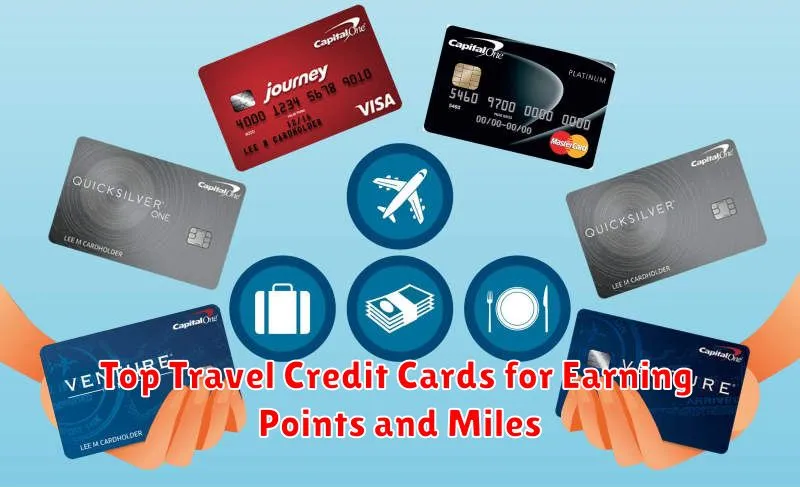Are you ready to unlock a world of travel perks? You’re in the right place. Choosing the right travel credit card can make your journey even more rewarding. Forget about the hassle of accruing points on multiple reward programs—with a travel credit card, you can consolidate your points and redeem them for flights, hotels, and even experiences. From earning valuable miles to enjoying exclusive airport lounge access, these cards offer a plethora of benefits designed to elevate your travel experience.
In this comprehensive guide, we’ll delve into the world of travel rewards credit cards. We’ll uncover the secrets to maximizing your rewards, explore the key features to look for, and guide you through the process of finding the perfect card for your travel aspirations. Whether you’re a frequent flyer, a budget-conscious traveler, or simply looking to upgrade your vacation, this guide will equip you with the knowledge to make informed decisions and unlock the full potential of travel rewards.
The Benefits of Using Travel Credit Cards for Rewards
Travel credit cards can be a valuable tool for savvy travelers looking to maximize their rewards and minimize their travel expenses. These cards offer a range of perks and benefits that can make a significant difference in your travel experience. Here are some of the key advantages of using travel credit cards for rewards:
Earning Points and Miles: One of the primary benefits of travel credit cards is the ability to earn rewards points or miles for your everyday spending. These points can be redeemed for a variety of travel-related expenses, including flights, hotels, car rentals, and more. Many cards offer bonus categories that allow you to earn even more points on specific types of purchases, such as dining, groceries, or travel.
Travel Insurance and Protection: Many travel credit cards come with built-in travel insurance and protection features. This can include coverage for trip cancellation, baggage delay, lost luggage, and even medical emergencies while traveling. Having these protections in place can provide peace of mind and potentially save you money in case of unforeseen events.
Exclusive Perks and Benefits: Some travel credit cards offer exclusive perks and benefits that can enhance your travel experience. This might include access to airport lounges, priority boarding, baggage fees waivers, or complimentary hotel upgrades. These perks can add a touch of luxury and convenience to your travels.
Travel Companion Benefits: Certain travel credit cards offer benefits for your travel companions as well. For example, you may be able to get companion tickets at discounted rates, free checked bags for your travel companions, or priority boarding for your entire family. These benefits can make traveling with others more affordable and enjoyable.
Flexible Redemption Options: Travel credit card rewards programs often offer a variety of redemption options. You can typically use your points or miles for flights, hotels, car rentals, cruises, and other travel experiences. Some programs also allow you to redeem for merchandise, gift cards, or even cash back. Having flexibility in your redemption options can help you maximize the value of your rewards.
Types of Travel Credit Card Rewards: Points, Miles, and More
Navigating the world of travel credit cards can be overwhelming, especially when you’re faced with a variety of reward programs. Understanding the different types of rewards offered is key to finding the right card for your travel needs. Here’s a breakdown of the most common travel credit card rewards:
Points
Points are a versatile form of reward, often offered by cards like the Chase Sapphire Preferred or the Capital One Venture X Rewards Credit Card. They can typically be redeemed for a variety of travel expenses, including flights, hotels, car rentals, and more. Some point programs have fixed redemption values, while others offer flexible redemption options, allowing you to potentially get more value for your points.
Miles
Miles, often associated with airlines like American Airlines AAdvantage or United MileagePlus, are earned by flying with that specific airline or through their co-branded credit cards. These miles can be redeemed for flights, upgrades, or other travel benefits. While miles are generally tied to specific airlines, some programs allow for limited flexibility in transferring miles to other travel partners.
Cash Back
Cash back rewards offer a more straightforward approach to travel rewards. Cards like the Chase Freedom Unlimited or the Discover it Cash Back allow you to earn cash back on your purchases, which can then be redeemed for travel expenses. The benefit here is the simplicity and predictability, as your rewards are directly reflected in your cash back earnings. However, cash back rewards may not offer the same value as miles or points when it comes to travel redemptions.
Other Rewards
Beyond points, miles, and cash back, some travel credit cards offer unique perks and benefits like:
- Travel insurance: Covering trip cancellation, medical emergencies, and other unexpected events
- Airport lounge access: Providing access to exclusive lounges with comfortable seating, food, and beverages
- Global entry/TSA precheck: Expediting your security clearance at the airport
- Priority boarding: Getting on the plane first and avoiding the rush
The ideal travel credit card reward program depends on your individual travel habits and preferences. Consider factors like your destination, preferred airlines, and the types of benefits that matter most to you when making your choice. By understanding the different types of rewards available, you can unlock the best travel perks and maximize the value of your spending.
Understanding Sign-Up Bonuses and Ongoing Rewards Programs
Before diving into specific credit cards, it’s crucial to understand the two main categories of rewards: sign-up bonuses and ongoing rewards programs.
Sign-up bonuses are one-time rewards offered to entice new cardholders. These bonuses are typically substantial, often in the form of bonus points or miles, and can be earned after meeting specific spending requirements within a limited timeframe. Think of them as a “welcome gift” for joining the program.
Ongoing rewards programs, on the other hand, are the continuous rewards you earn for using your card. These programs typically offer points or miles for every dollar spent, with bonus categories that earn even more rewards for spending in specific areas like dining, travel, or groceries. This ongoing earning potential is what makes travel credit cards so valuable in the long run.
Understanding these two categories is key to choosing the right credit card for your travel needs. Do you prioritize immediate rewards or ongoing earning potential? Analyzing both sign-up bonuses and ongoing rewards programs will help you make a well-informed decision.
Key Factors to Consider When Choosing a Travel Credit Card
Choosing the right travel credit card can unlock a world of benefits, from earning valuable rewards to accessing exclusive airport lounge access. However, with so many options available, it’s crucial to carefully consider key factors to ensure you select the card that best aligns with your travel needs and spending habits.
1. Rewards Structure: The most important factor is understanding how rewards are earned and redeemed. Some cards offer points that can be redeemed for flights, hotels, and other travel expenses, while others offer cash back that can be used for any purchase. Analyze the earning structure, redemption options, and value of the rewards to determine which card offers the most significant benefits for your typical travel expenses.
2. Sign-Up Bonus: Many travel credit cards offer lucrative sign-up bonuses, such as bonus points or miles, for reaching a specific spending threshold within a certain timeframe. Evaluating the value of the bonus and the ease of meeting the spending requirement will help you decide if the offer is worth it.
3. Annual Fee: Consider the annual fee associated with the card. Some cards offer no annual fee, while others charge a fee for premium benefits. Weigh the value of the perks against the annual cost to determine if the card is worth the expense.
4. Travel Benefits: Travel credit cards often offer valuable perks like airport lounge access, travel insurance, and baggage delay protection. These benefits can significantly enhance your travel experience and potentially save you money in the long run. Assess the specific perks offered and their value to your travel needs.
5. Transfer Partners: If the card offers transferable points, research its airline and hotel transfer partners. This flexibility allows you to redeem points for a wider range of travel options and potentially maximize their value.
6. Spending Categories: Consider the card’s spending categories and how they align with your typical travel expenses. Some cards offer bonus points or miles for specific purchases, such as flights, hotels, or dining, which can maximize your rewards earning potential.
7. Interest Rate and APR: While the primary focus should be on maximizing rewards, it’s crucial to understand the interest rate and annual percentage rate (APR). Avoid carrying a balance on your card as high interest rates can quickly negate the value of your rewards.
By carefully evaluating these key factors and understanding your travel habits, you can choose the travel credit card that best suits your needs and unlocks a world of travel perks.
Top Travel Credit Cards for Earning Points and Miles

Earning points and miles on your credit card can unlock amazing travel experiences. From free flights to luxurious hotel stays, the right travel credit card can help you maximize your rewards and save money on your next adventure.
Here are some of the top travel credit cards known for their generous rewards programs:
Chase Sapphire Preferred® Card
The Chase Sapphire Preferred® Card is a popular choice thanks to its generous points earning potential and flexible redemption options. You’ll earn 2 points per $1 spent on travel and dining, and 1 point per $1 on all other purchases. Your points can be redeemed for travel through Chase Ultimate Rewards, including flights, hotels, and car rentals. You can even transfer your points to airline and hotel partners. This card also offers a generous sign-up bonus, and it’s known for its excellent travel insurance benefits.
Capital One Venture X Rewards Credit Card
The Capital One Venture X Rewards Credit Card is a premium travel credit card that offers a high annual fee, but it comes with a lot of benefits. You’ll earn 2 miles per $1 spent on all purchases, and you can redeem those miles for any travel, with no blackout dates. You’ll also get access to Capital One Lounges, Priority Pass lounges, and other perks, such as Global Entry or TSA PreCheck statement credits.
The Platinum Card® from American Express
The Platinum Card® from American Express is a top-tier travel credit card with a high annual fee. However, it offers a wide range of benefits, including upgraded hotel stays, priority airport check-in and security lines, and access to airport lounges. It also comes with a generous sign-up bonus and earns rewards on a variety of spending categories, including travel and dining.
Before applying for a travel credit card, it’s important to compare the features and benefits of different cards to find one that’s right for your travel needs and spending habits. Consider factors such as annual fees, rewards rates, sign-up bonuses, and redemption options. By choosing the right travel credit card, you can start earning valuable points and miles that can help you unlock incredible travel experiences.
Maximizing Your Rewards: Strategies for Earning and Redemption
Travel credit cards offer a fantastic way to earn rewards and unlock exciting travel experiences. To truly maximize these perks, it’s essential to understand the nuances of earning and redeeming points. Here are some key strategies to help you get the most out of your travel rewards:
Know Your Card’s Earning Structure: Each credit card has its own unique points earning system. Some offer bonus points on specific categories like dining, travel, or groceries, while others provide a flat rate across all purchases. By understanding your card’s structure, you can prioritize spending in areas where you’ll earn the most points.
Maximize Bonus Categories: If your card offers bonus points on specific categories, make an effort to concentrate your spending in those areas. For instance, if your card provides extra points for travel purchases, consider booking flights, hotels, and car rentals through the card’s portal or directly with travel providers.
Look for Sign-Up Bonuses: Many travel credit cards offer lucrative sign-up bonuses. These bonuses can often grant you a significant number of points or miles, allowing you to quickly accumulate enough for a rewarding redemption.
Plan Your Redemptions Wisely: It’s vital to plan your redemption strategies in advance. Consider the value of your points or miles when redeemed for different types of travel. Some cards might offer better value for flights, while others excel in hotel redemptions.
Utilize Transfer Partners: Many travel credit cards allow you to transfer your points to airline or hotel loyalty programs. This can provide you with greater flexibility and access to a wider range of redemption options. Research and choose transfer partners that align with your travel preferences.
Redeem for Premium Experiences: Instead of using your points for basic flights or hotels, consider redeeming them for premium experiences. This could include business class flights, luxurious hotels, or upgrades like lounge access and airport transfers.
Airline-Specific vs. General Travel Credit Cards: Which is Right for You?
When choosing a travel credit card, you have two main categories to consider: airline-specific cards and general travel cards. Both offer perks like bonus points and miles, but they cater to different travel preferences and spending habits.
Airline-specific cards are tied to a particular airline, offering advantages like:
- Priority boarding and baggage handling
- Companion tickets or discounts on flights
- Free checked bags
- Lounge access
These benefits are ideal for frequent flyers loyal to a specific airline. However, the value is limited to that airline, and the points earned may not be transferable to other programs.
General travel cards, on the other hand, provide flexibility and broader rewards. They often offer:
- Points transferable to multiple airlines and hotels
- Travel insurance and other benefits
- More comprehensive rewards programs
These cards are perfect for travelers who don’t have a preferred airline or prefer the freedom to use points for various travel experiences.
Ultimately, the best choice depends on your individual travel patterns and priorities. If you frequently fly with a specific airline and value its perks, an airline-specific card might be the better option. If you seek flexibility and prefer a broader range of redemption options, a general travel card is more suitable.
Tips for Avoiding Fees and Interest Charges on Your Travel Card
To make the most of your travel credit card, you need to be mindful of the fees and interest charges that can quickly eat away at your rewards. Here are some tips for avoiding these pitfalls:
Pay your balance in full each month: This is the most important tip for avoiding interest charges. If you carry a balance, you’ll be charged interest on it, which can quickly add up.
Be aware of foreign transaction fees: Many credit cards charge a fee for using your card overseas. Look for a card that waives foreign transaction fees to save money on international purchases.
Avoid ATM withdrawal fees: Some credit cards charge a fee for withdrawing cash from an ATM. If you need cash, use a card with no ATM withdrawal fees, or consider using your debit card.
Be mindful of annual fees: Many travel credit cards have an annual fee. Before you apply for a card, make sure the rewards outweigh the annual fee.
By following these tips, you can avoid unnecessary fees and interest charges and maximize your travel credit card rewards.
Building Credit Responsibly with a Travel Credit Card

While travel credit cards offer enticing rewards, it’s crucial to use them responsibly to build positive credit history. Here’s a guide to help you navigate credit building with a travel credit card:
Start with a Secure Card: If you’re new to credit, consider starting with a secure credit card. These cards typically require a security deposit, which helps reduce risk for the issuer. This can be a good stepping stone to building credit before graduating to a travel credit card.
Choose a Card with a Low APR: The Annual Percentage Rate (APR) represents the interest you’ll pay on your balance. Opt for a travel credit card with a low APR, particularly if you anticipate carrying a balance. This will minimize the cost of borrowing.
Pay Your Balance in Full and On Time: Timely payments are crucial for building good credit. Aim to pay your balance in full each month to avoid accruing interest. Late payments can negatively impact your credit score.
Keep Your Credit Utilization Low: Credit utilization ratio is the amount of credit you use compared to your total credit limit. Aim to keep this ratio below 30%. A lower utilization ratio demonstrates responsible credit management.
Monitor Your Spending: Track your spending on your travel credit card to avoid overspending. Set a budget and stick to it to ensure you can comfortably manage your balance.
By following these tips, you can harness the power of travel credit cards to build strong credit while enjoying the perks of travel rewards. Remember, responsible credit management is key to achieving financial stability.
Travel Hacking Basics: Leveraging Credit Cards for Affordable Travel

In the realm of travel, “hacking” doesn’t involve any illegal activities. Instead, it refers to utilizing credit card rewards programs to maximize travel benefits and minimize expenses. The cornerstone of travel hacking lies in strategically selecting and leveraging credit cards that offer lucrative rewards for your travel habits.
The basic premise is straightforward: you earn points or miles by making everyday purchases with your chosen credit card. These points and miles can then be redeemed for flights, hotels, rental cars, and other travel-related experiences. By accumulating rewards through smart spending, you can essentially “hack” the system, securing your travel goals with reduced financial strain.
Here’s a glimpse into the fundamentals of travel hacking with credit cards:
- Choose the Right Cards: Carefully assess your spending patterns and travel preferences. Look for credit cards that align with your needs, offering lucrative rewards for the categories you spend the most in (e.g., airlines, hotels, dining).
- Maximize Sign-Up Bonuses: Many travel credit cards entice new cardholders with hefty sign-up bonuses, often in the form of bonus points or miles. Capitalize on these offers to jumpstart your rewards accumulation.
- Strategic Spending: Prioritize using your travel credit card for everyday purchases, from groceries to gas to utilities. This consistent spending helps you rack up points or miles quicker.
- Partner Programs and Transfers: Explore credit card partnerships with airline and hotel loyalty programs. You can often transfer your earned points to these programs, expanding your redemption options.
- Smart Redemptions: Don’t rush to redeem your points or miles prematurely. Research the best redemption options, often through travel portals or directly with airlines and hotels, to ensure you maximize their value.
Remember that travel hacking is not about accruing debt. Responsible credit card usage is essential. Always pay your balance in full each month to avoid interest charges and maintain a healthy credit score.
Keeping Track of Your Rewards and Benefits
As you start racking up points and miles with your travel credit card, it’s essential to keep track of your rewards and benefits. This helps you maximize their value and avoid missing out on valuable perks. Many travel credit cards offer online portals and mobile apps where you can easily track your points balance, redeem rewards, and view your statement.
Here are some tips for keeping track of your rewards and benefits:
- Set up email alerts: Most credit card companies offer email alerts to notify you when your points are about to expire or when you’ve earned enough points for a specific reward.
- Use a rewards tracking app: There are many third-party apps available that can help you track your rewards across multiple credit cards and loyalty programs.
- Check your credit card statement regularly: You can see your points balance, redemption activity, and other important information about your rewards program on your credit card statement.

